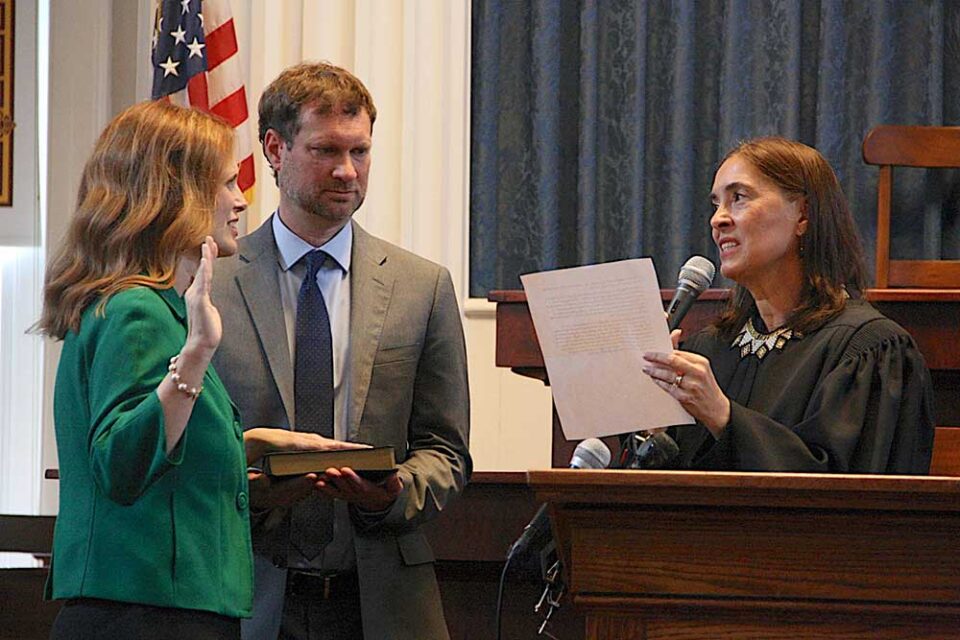By Alex Bass
Alex.bass@triangletribune.com
RALEIGH – Reyna Walters-Morgan, the Democratic National Committee’s vice chair of Civic Engagement and Voter Protection, quoted the Rev. Martin Luther King Jr. after Democratic incumbent Allison Riggs was sworn in as a N.C. Supreme Court justice Tuesday – more than six months after Election Day.
“Justice too long delayed is justice denied,” Walters-Morgan said, echoing the slain King.
Walters-Morgan’s prevailing point concerned the long-term implications of the attempted disenfranchisement of more than 65,000 eligible, rules compliant voters – including Riggs’ parents – whose names and votes have been tossed around in state and federal lawsuits that could have reversed the outcome of an election Riggs won by 734 votes over Jefferson Griffin, a state court of appeals judge.
Walters-Morgan, a lawyer, was astounded by the notion that trying to change electoral rules after an election was entertained as a plausible strategy. “They’re doing something wrong,” she said bluntly.
Rep. Abe Jones (D-38), a lawyer and previous district court judge, called the Griffin-Riggs case a landmark one, and this state’s most compelling of its kind since the turn of the century. “They were trying to steal that seat,” Jones said. “The guy shouldn’t be a judge, really.”
Griffin, a Republican, conceded the race the week before Riggs’ swearing- in ceremony after a Republican-appointed federal judge called for the race’s certification. “If they can do that one time,” Jones continued, “then they can do it over.”
Sen. Dan Blue (D-14) noted that how much time was needed to resolve what was the country’s last uncertified race from November requires unceasing vigilance in protecting voting rights, as filing for 2026 elections begins on Dec. 1. State supreme, appellate and district courts all have had times in the 21st century when candidates ran without political party affiliations on electoral ballots.
Blue considers grassroots efforts’ heightened emphasis and urgency concerning nonpartisan judicial elections as imperative. “It’s hard to play a fair game if you don’t have a neutral official,” he said. “The referee can’t identify with one team or the other, if you want a true referee.”
Blue said he is aware of talk about the possibility of separate rules for N.C. voters participating in state elections relative to federal elections. He does not see that becoming an issue when all is said and done. “The cost would be ridiculous,” Blue said of electoral operations expenses, among other details.
There, already, is the matter of “irreparable damage done to our democracy,” Riggs said after taking her oath of office, as an impetus for grassroots advocacy.
“Every baseless claim to delegitimize the results of the 2024 North Carolina Supreme Court race had to be refuted — not just for one race or party, but to reaffirm the integrity of the entire political process,” N.C. Black Alliance Deputy Director Marcus Bass said.
Jones said the focus now must begin with citizen self-education. He called for each individual to select their own reputable media source, and spend 15-30 minutes per day expanding their knowledge base in preparation for turning out in record voting numbers. “You can’t take it all on,” Jones said. “Pick your strength, and watch it.”
Walters-Morgan will remain attuned to proposed federal legislation including the SAVE Act, which requires voters to provide proof of U.S. citizenship. Women – with a maiden name on their birth certificate but a married name on other documents – could be affected disproportionately. They could need a passport to vote.
“Then it is a problem, and it does amount to a poll tax,” she said.

